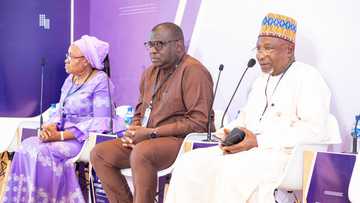Attaining National Development Through Local Government Autonomy By Chesa Chesa
Editorial note: Chesa Chesa, an Abuja-based journalist in this piece called for a restructuring of Nigeria's polity in order to give room for the kind of development citizens need to thrive in. Chesa also opines that true development can be achieved through local government autonomy which in turn hands power over to the people.
PAY ATTENTION: Сheck out news that is picked exactly for YOU ➡️ find the “Recommended for you” block on the home page and enjoy!
One of the ubiquitous words in Nigeria's political lexicon is 'grassroots'; used to imply the 'ordinary' person or 'common man' on the streets, especially in the rural areas and hinterlands. Unarguably, a majority of Nigerians constitute the grassroots, who live in the 774 local government councils that constitute the country.
Indeed, the concept of three tiers of government in Nigeria's democracy - divided into the Federal, State and Local governments - is meant to bring better governance at the rural level and engender faster community-based development at the grassroots.

Source: UGC
According to a World Bank report on the decentralisation of governance and community-driven development released in 2013: "The Community-Driven Development (CDD) and decentralization nexus can empower communities to exert influence over local governance and services. CDD and decentralization are both about empowering people at the local level.
"The rationale for decentralization in the context of CDD includes economic efficiency, public accountability, and empowerment:
PAY ATTENTION: Share your outstanding story with our editors! Please reach us through info@corp.legit.ng!
It gives greater voice and choice to citizens to influence decisions that affect their lives, allows local governments to respond dynamically to communities and results in allocative efficiency by matching local needs and preferences with patterns of local public expenditure (assumes substantial fiscal autonomy)."
As the tier of government that most Nigerians are supposed to be interacting with more often than not, strong and viable local governments can minimise insecurity, stimulate the local economy and reduce poverty. Indeed, the World Bank insists that “poverty is best tackled at the local level”.

Read also
2023 elections: Why Nigeria's presidential candidates must commit to Universal Healthcare Coverage
While politicians always insist they desire to improve the lot of the common man, they have always tended to distance themselves from the very people they claim to serve.
The local government system, which is closest to the grassroots, has been grossly inadequately utilised to achieve much-needed development, thus negating the raison d'être.
Much of the blame has been placed on State Governors as they often exploit the loopholes in the Constitution to hijack or frustrate the operations of the third tier of government. A readily cited case is the operation of State/Local Government joint accounts, through which governors siphon funds meant for local government councils.
In a recent Arise TV interview, President Muhammadu Buhari painted the sad picture of what many Governors do thus: “You as a local government are supposed to receive N300 million. A document is given to you to sign that you have received N300 million, but you are given only N100million”. Governors have also been known to sack elected local government chairmen and other officials, only to replace them with lackeys named sole administrators, caretakers or transition committees.
As part of efforts to find solutions, stakeholders at various fora have canvassed according to more leverage to local governments by granting them a larger measure of autonomy. Even the National Assembly has weighed in and passed bills for greater financial autonomy for the local councils, only for such efforts to be ironically frustrated by the State Houses of Assembly, through processes obviously orchestrated by State Governors.
The Governors have even opposed President Buhari’s Executive Order 10 of 2020, which grants financial autonomy to local governments as well as state legislatures and judiciaries. In turn, the Nigeria Union of Local Government Employees (NULGE) has frowned at such opposition, saying that it would also resist any attempt by Governors to scuttle the newly passed Local Government Autonomy Bill at the State level after it was passed by the National Assembly.
This was after the approval of the proposed amendments to the 1999 Constitution to grant financial autonomy to State legislatures, judiciary and the 774 local government councils by the National Assembly. The approval followed the review of the 1999 Constitution (5th alteration) Bills 2022.
The President of NULGE, Akeem Olatunji, said the union got credible intelligence that State Governors were making frantic efforts to frustrate the required concurrence on passage of the Bill at the State Houses of Assembly.
According to him, the Governors’ Forum was trying to further destroy the third tier of government, an unfortunate situation he asserted had caused insecurity at the grassroots.
Still on solutions, many have rightly argued that 'restructuring' of the polity will pave the way and enhance local government administration in Nigeria. Besides mouthing restructuring as a mere campaign slogan, especially during election seasons, political leaders and aspiring leaders should take local government autonomy more seriously, or better still be forced by the electorate to handle the challenge more honestly and seriously.
It is commendable that the Nigerian Financial Intelligence Unit (NFIU) issued some guidelines aimed at curbing money frauds perpetrated via cash withdrawals from local government accounts by various State governments. It advised banks not to honour transactions from State/Local Government joint accounts, which should be restricted to receiving funds and subsequently transferring them to local government accounts only. The guidelines also reduced cash withdrawal from local government accounts to N500,000 daily. These measures prove to be a huge relief to local governments, especially with regard to salary payments. Although the Governors' Forum took the matter to court, it lost the case when the judgement was delivered last May.
Therefore, there is no harm in mixing advocacy, and sensitisation with legal challenges. It is encouraging that the Federal Government apparently favours autonomy for local councils, but is handicapped by the peculiarity of Nigerian politics which put the third tier of government in a suffocating fix, in the face of an intimidating State Governor.
Public awareness and sensitisation need to be escalated by civil society organisations and unions like NULGE. It is ironic that many times, those who should be championing local government autonomy, oppose the reforms for selfish, corruption-laden reasons.
Change is constant, and stringent advocacy will go a long way in helping a government that wants to lift millions of its citizens out of poverty. This is even more necessary as the citizens at the grassroots are most affected in the poverty quagmire.
Disclaimer: The views and opinions expressed here are those of the author and do not necessarily reflect the official policy or position of Legit.ng.
Your own opinion articles are welcome at info@corp.legit.ng— drop an email telling us what you want to write about and why. More details in Legit.ng’s step-by-step guide for guest contributors.
Contact us if you have any feedback, suggestions, complaints, or compliments.
Source: Legit.ng







